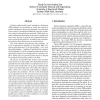Free Online Productivity Tools
i2Speak
i2Symbol
i2OCR
iTex2Img
iWeb2Print
iWeb2Shot
i2Type
iPdf2Split
iPdf2Merge
i2Bopomofo
i2Arabic
i2Style
i2Image
i2PDF
iLatex2Rtf
Sci2ools
121
click to vote
CGO
2003
IEEE
2003
IEEE
Optimal and Efficient Speculation-Based Partial Redundancy Elimination
Existing profile-guided partial redundancy elimination (PRE) methods use speculation to enable the removal of partial redundancies along more frequently executed paths at the expense of introducing additional expression evaluations along less frequently executed paths. While being capable of minimizing the number of expression evaluations in some cases, they are, in general, not computationally optimal in achieving this objective. In addition, the experimental results for their effectiveness are mostly missing. This work addresses the following three problems: (1) Is the computational optimality of speculative PRE solvable in polynomial time? (2) Is edge profiling -- less costly than path profiling -- sufficient to guarantee the computational optimality? (3) Is the optimal algorithm (if one exists) lightweight enough to be used efficiently in a dynamic compiler? In this paper, we provide positive answers to the first two problems and promising results to the third. We present an algor...
Related Content
| Added | 23 Aug 2010 |
| Updated | 23 Aug 2010 |
| Type | Conference |
| Year | 2003 |
| Where | CGO |
| Authors | Qiong Cai, Jingling Xue |
Comments (0)

